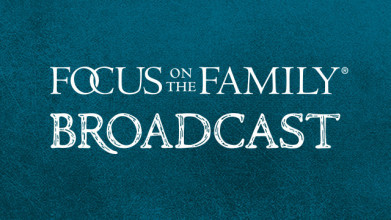Preview:
Shaunti Feldhahn: If you go, “Ah, you know, I just, I felt like something was gonna happen tonight and it didn’t, and I’m so disappointed,” or, “I feel like there’s pressure, like I don’t know when there’s an expectation towards me,” well, if you talk about, well what are our signals like that will tell me when you’re interested or when you’re open? And suddenly, wow, you can connect.
End of Preview
John Fuller: That’s Shaunti Feldhahn describing how to have healthy intimacy in marriage, and she’ll be joining Dr. Michael Sytsma today on Focus on the Family. I’m John Fuller, and thanks for tuning in. Uh, your host is Focus president and author Jim Daly. Let me just note that this program will contain some mature topics. Uh, we’ll recommend that you direct the attention of younger listeners and viewers elsewhere.
Jim Daly: Uh, John, I’m so glad that we’re coming back for a second day to speak on this subject. A- as I mentioned last time, this is a hard conversation to have in Christian circles. I get that, but we need to have this discussion. Last time, we touched on the idea of being normal. I mean, who knows what that is? And how that’s more of a conversation starter than a standard for married couples to follow in their physical intimacy. We also discussed how to deal with our own insecurities, as well as our spouse’s and how we can help point them, uh, to move closer to Christ. In this program, uh, we’re gonna continue to conversation and address different desire types, how to communicate well in your intimate life and how to bring glory to God in the design that he created for sexuality.
John: And you can listen to the first part of this conversation at focusonthefamily.com/broadcast. Shaunti Feldhahn is a social researcher, a best-selling author, a very popular speaker, and, uh, a return guest here at Focus. She does a great job of turning statistics into life-changing truths about relationships. She and her husband Jeff have two kids. And we also have Dr. Michael Sytsma here. He’s a licensed professional counselor and a certified sex therapist, with over 30 years of clinical experience. Uh, he is the founder of Being Intimate Marriages Incorporated and co-founder of Sexual Wholeness Incorporated. And, uh, together, Dr. Sytsma and Shaunti have written a book about healthy sexuality in marriage. It’s called Secrets of Sex and Marriage: 8 Surprises That Make a Difference. Find out details about the book and get your copy at focusonthefamily.com/broadcast.
Jim: Shaunti and Michael, welcome back.
Dr. Michael Sytsma: Thanks.
Shaunti: Thanks so much.
Jim: It’s so good to have you. And thank you for writing this great book, Secrets of Sex and Marriage: 8 Surprises That Make All the Difference. I mean, I’m going, okay, I need four copies right now.
Shaunti: (laughs).
Dr. Sytsma: (laughs).
Jim: And for me and all my buddies. But, uh, you know, what a topic. This is a tough topic. Michael, let’s start with you.
Dr. Sytsma: Mm-hmm.
Jim: Uh, what are the three different types of desire, and why are they important and why should we know about it?
Dr. Sytsma: Yeah. That’s a great question because we have this idea that desire is, um, I want something and I’m pursuing it, which is a primary type of desire. So, we talk about an initiating type of desire. That’s the, what we generally think of, um, I have these thoughts and I’m pursuing it. Um, and many times, we think that is what sexual desire is supposed to look like, that we wake up, we’re thinking about it, and we’re pursuing it. And when our spouse doesn’t have that type of desire, it, we think something’s wrong. Uh, but we’re not recognizing that there’s a whole second type of desire that once it’s there and it’s offered and I’m drawn into it, then it turns on. And what we’ve learned in the research is that a lot of bodies are designed to work that way, that the desire just isn’t prominent.
Jim: But y- you wake up-
Dr. Sytsma: They don’t wake up thinking about it.
Jim: Right. And the second one, is that receptive?
Dr. Sytsma: Exactly.
Jim: Yeah.
Dr. Sytsma: And that requires something that, um, sparks me to think about it. So, the stereotype would be the husband coming in and saying, “You look really good. It’s been a few days,” and she goes, “Wow, I haven’t thought about it in a few days.” You know, if I get the- the laundry done and I get the kids in bed and if, if, if, if, then maybe we can, and he’s a little hurt because she wasn’t in that initiating sense, but that’s not how hers works. Hers works by agreeing to, and then they begin to get engaged, and she experiences the feelings and she enjoys the connection, and then the desire turns on in her brain. So, um, so sometimes it’s five, 10 minutes in before her desire actually clicks in.
Jim: Right.
Dr. Sytsma: And now she’s experiencing desire. That’s the receptive type of desire. And if he demands that she have the initiating type of desire, it’s, they’re gonna always be in a miss. And he thinks something’s wrong with her, she thinks something’s wrong with her. She’s tired of the pressure of trying to be who she’s not. It really goes poorly.
Jim: What, uh, the resistant, the third observation, describe that quickly.
Dr. Sytsma: That’s the person that’s got on the parking brake. You know, the- there’s a variety of reasons why maybe they’re resistant to this, but even with setting up the right atmosphere, they don’t want to engage. It may be trauma from the past. It may be you’ve really wounded my heart-
Jim: Huh.
Dr. Sytsma: … this week and you haven’t cleaned that up. It may be issues that are going on internally. There, often there’s really good reasons. Sometimes they’re not so good reasons. It- it’s meaningful why they’re resistant, but that’s a person who’s kind of locked down.
Jim: Yeah, that’s really good.
Shaunti: And that’s also a pretty small percentage of people.
Dr. Sytsma: It’s a-
Shaunti: Like 3 or 4% of men-
Dr. Sytsma: Correct.
Shaunti: … and 3 or 4% of women.
Jim: Well, that’s interesting.
Shaunti: Yeah. Yep.
Jim: Uh, Shaunti, that- that idea of initiation or frequency, if we can-
Shaunti: Mm-hmm.
Jim: … call it that, I mean, that- that- that kind of is the- the big question that, if you are talking to somebody else, and certainly in counseling, Dr. Mike-
Dr. Sytsma: Mm-hmm.
Jim: … you’ve seen that, people don’t know, because we’re not openly discussing this, what-
Shaunti: (laughs).
Jim: … you know, how- how often are you having sex with your spouse.
Shaunti: Right.
Jim: It just, you know, rightfully, it doesn’t come up.
Shaunti: You don’t have those conversations, yes.
Jim: So, you don’t know if once a week is normal, twice a week is normal.
Dr. Sytsma: Right.
Jim: Once a month. I mean, people, it’s a variety of expression. So, how have you heard that question and how do you address it?
Shaunti: You know, it’s interesting. H- the- the easiest sort of way of catching somebody’s attention when you’re talking about this and helping them feel like, oh, wow, we are kind of normal, is to say that 79% of couples have disagreements about frequency.
Jim: They’re, okay.
Shaunti: (laughs) Right? So, eight in 10.
Jim: So it’s high octane, 79%.
Shaunti: Yeah. Eight in 10 couples, there is a mismatch. And that right there says, okay, that’s a simple issue, so to speak, in quotes, and yet it can cause a-
Dr. Sytsma: Well, it’s normal.
Shaunti: It’s normal.
Dr. Sytsma: You’re normal if you disagree.
Jim: It’s prevalent.
Shaunti: It’s normal.
Dr. Sytsma: Yes.
Jim: It’s prevalent, yeah.
Shaunti: But it can cause a lot of emotional pain because of what Dr. Mike was saying, as like, why don’t you want me? Why aren’t you interested?
Dr. Sytsma: Why aren’t you like me?
Shaunti: Why aren’t you like me? And the- that is what you don’t realize that you’re asking. And so one of the things we always encourage people to, um, sort of be aware of-
Jim: Mm-hmm.
Shaunti: … is that you don’t realize that both of you, both the husband and the wife, and again let’s be stereotypical about this, it could be flipped, right?
Jim: Yeah.
Shaunti: But both the husband and the wife are believing a Hollywood myth that they don’t realize that they even have in their head.
Jim: Mm-hmm.
Shaunti: Which is that everything you’ve seen on television or the movies, which is really the only thing you see other than your own relationship-
Jim: Uh-huh.
Shaunti: … so you think it just is that the guy and the girl look at each other and they both have that spark, that hunger, and pretty soon the clothes are off and they’re in bed. And you think that’s the way it’s just supposed to work, and so if it doesn’t, I, uh, if, ah, that’s not how I feel, something’s wrong with me. I’m broken.
Jim: Yeah.
Shaunti: And that’s the encouragement to people, is recognize, okay, there is maybe a small percentage of chance that there is something amiss, you know, medical issue or whatever, but usually that 79% of couples that are mismatched, it’s not that there’s anything broken (laughs). It’s just literally different physiologies. You haven’t talked about certain things.
Jim: Well, let- let’s get into that a little.
Shaunti: Yeah.
Jim: We’ll give somebody some help here. Uh, what are some steps we can take to initiate effectively and to receive effectively?
Shaunti: Well, that actually brings up one of the other topics that was a big surprise to me, is that quite often the reason you’re not connecting isn’t that somebody has like a lower sex drive or, you know, whatever. That’s what you think. It’s not. And it’s also maybe not even that you’re different types of desire. It could literally be that you guys don’t have a way to initiate.
Jim: Mmm.
Dr. Sytsma: That’s effective.
Shaunti: And it’s, that’s effective and that you even know that there’s signals of openness or interest that are being sent. And so that one thing, if you go, “Ah, you know, I just, I felt like something was gonna happen tonight and it didn’t and I’m so disappointed, or I feel like there’s pressure, like I- I don’t know when there’s an expectation towards me,” well if you talk about, well, what are our signals like that will tell me when you’re interested or when you’re open-
Jim: Mm-hmm.
Shaunti: … and suddenly, wow, you can connect. Can I tell them about the mirror score?
Dr. Sytsma: Yes, yep.
Shaunti: Is it, are you okay if I-
Dr. Sytsma: Yeah. I love collecting stories that answer the question-
Jim: Yeah.
Dr. Sytsma: … that you just asked, how do … Because it’s really unique from couple to couple and they have to talk about it, but this is one of my favorite chats.
Shaunti: I- I love this. This is a couple that basically said, “We have to come up with some way to convey when we’re interested or open,” or whatever. And so this one husband will check his mirror every evening, and his wife after work will write in sort of erasable marker on the mirror in the bathroom in a little discrete corner a number from one to 10. And numbers eight to 10 are basically her saying, “I’m a sure thing if you ask,” you know.
Jim: (laughs).
Shaunti: And numbers one through four are basically stay back if you want to keep your parts (laughs).
Jim: Wow.
Shaunti: And five, and the, sort of the middle numbers, the sort of five to seven are, well, maybe.
Jim: Negotiable.
Shaunti: I don’t know. It’s been a long day, uh, you know, sort of.
Dr. Sytsma: It depends on how- how well he can draw her in-
Jim: Wow.
Dr. Sytsma: … you know, at that point.
Shaunti: And- and thinking about that in a husband and how- how freeing-
Jim: Yeah.
Shaunti: … it is to not have to wonder and worry and feel pressure and it, ’cause you’ve got a signal.
Jim: Yeah.
Shaunti: And there’s tons of different signals that could be out there.
Jim: Oh, I know. I’m thinking of a friend that I do know. He calls it the budget meeting.
Dr. Sytsma: Uh-huh.
Shaunti: The what? (laughs).
Jim: And so, they have a once a week budget meeting. So when their kids were smaller, they didn’t want to-
Shaunti: Oh, that’s awesome.
Jim: … you know, but they would say, “Are we gonna go over the budget tonight?” (laughs) And then yes or no.
Shaunti: (laughs).
Jim: You know.
Dr. Sytsma: And my invitation is for couples to just identify with each other, you know, what do you, how do you know when your spouse is in the mood? And does that work for you?
Jim: Yeah.
Dr. Sytsma: Is the way they initiate it working? Because often what we do, just it’s like slamming on the brakes for our partner, and it doesn’t take too much to shift to something that draws us in.
Jim: Well, and- and Michael, I wanted to ask you about that, because the- the mirror example is a good one to bounce off of. What if consistently-
Dr. Sytsma: Mm-hmm.
Jim: … you’re looking at the mirror hoping, and either there’s nothing there or it’s-
Dr. Sytsma: Right.
Jim: … one.
Dr. Sytsma: And- and that’s a conversation-
Jim: For the fifth week in a row.
Dr. Sytsma: That’s a conversation for the couple to have. And what I find most common in my office is that, um, she, uh, because we’ve identified her as the lower desire, she’s saying, “I don’t have the initiating type of desire.” And she is even misreading herself, that helping to shift it to where she can say, “Could I be receptive tonight?” And what’s happening is he’s coming in and he is trying to initiate, and she’s not immediately responding to it, he’s getting all hurt and bent out of shape, and then not acting very attractive.
Jim: (laughs) Right.
Dr. Sytsma: And- and sometimes the wives say, “You know, it takes me a few minutes to sort through this,” and then they look up and they think, yeah, I could do it, but not with you, not with how you’re acting right now.
Jim: Huh.
Dr. Sytsma: And- and if he can stay calm and- and she says, “Well, maybe it’s okay,” now, how do I draw her in? How do I recognize that she’s going to be receptive, she’s willing to be receptive? And I’m gonna step up my game and I’m gonna draw her into this, and her be willing too.
Jim: I think one question we need to ask, I- I just can sense somebody screaming, saying, “Wh- where’s God in all this?”
Dr. Sytsma: Mm-hmm.
Jim: I mean, what has God designed this to be and why does it seem so dysfunctional for me? ‘Cause it should be a good thing. This is a gift. It’s a wedding present.
Dr. Sytsma: Yeah. I, you know, this is, that’s one of my favorite questions to wrestle with the integration of it and how it fits in. And, uh, I like to point to Christ standing in the book of Revelation, and He’s just identified Himself as the groom. And He says, um, that, He looks at His bride and He is always invitational with her. He’s always inviting her in. And He asks the bride to be receptive to it. He says, “Behold, I stand at the door and I knock.” Not I’m pounding on the door.
Jim: (laughs) Right.
Dr. Sytsma: Not I’m trying to bust the door down. Not I’m- I’m demeaning because you’re not opening the door. I’m not threatening to go to the next door neighbor. I’m just standing here saying I’m open, and the invitation for spouses is, be open, be invitational. And then He says, “If anyone will hear my voice and open the door, I will come in and we will have,” in His language, there is a sensual feast together. “We will enjoy that time.” And I think God puts both of those often into the same marital relationship, where one tends to be more receptive and the other more initiating.
Jim: Mmm.
Dr. Sytsma: And as long as they accept influence from each other, as long as they allow that yours works a little different than mine, I’m gonna become a student of you, I’m gonna be curious and figure out how, then it can work really well.
Jim: Mmm.
John: Yeah. That’s Dr. Michael Sytsma. He and Shaunti Feldhahn are our guests today on Focus on the Family. Thanks for joining us. Jim Daly is your host, and, uh, we want to commend their book, Secrets of Sex and Marriage: 8 Surprises That Make All the Difference. There’s so much here, and, uh, you can find out more when you call us, 800, the letter A and the word FAMILY, or stop by focusonthefamily.com/broadcast.
Jim: Uh, Dr. Mike, let me ask you this. Uh, pornography, I’m shocked at what research, Shaunti, to your vocation-
Shaunti: Mm-hmm.
Jim: … is saying. The number of people, both men and women.
Dr. Sytsma: Right.
Jim: Men to a higher degree, but, uh, it- it’s a big number. I mean, one, uh, survey I saw, it was 68% roughly-
Dr. Sytsma: Mm-hmm.
Jim: … of men in the church-
Dr. Sytsma: Mm-hmm.
Jim: … that were using pornography. That, first off, that sounded high to me. I thought, man, is that really the number? But then it, so let’s ask that question. Then you could follow-up just about the damage pornography does in a marriage.
Dr. Sytsma: And some of it is we don’t really know because it depends on how you ask the question.
Jim: Sure.
Dr. Sytsma: You know. And how you define what pornography is. Um, some couples, um, have a very rigid definition of pornography, and some have a broader, and that’s part of the trouble we have in the field of researching it, is how do we define it? But I suspect that the number is at least that high, that there’s some kind of regular consumption of it.
Jim: Hmmm.
Dr. Sytsma: You know, we stand at an altar and we say, “Forsaking all others, I cleave to you. I choose not to engage this part of my life with another else.” And if that’s been the covenant, then many times pornography is seen as a breach of that covenant and it does great damage because it’s a breach of what I expected. I thought you were only ever going to focus on me. You’re only gonna get your sexual fulfillment with me. And now that you’re not, I feel betrayed. That’s a legitimate sense of betrayal, and the couple needs to sort through what are the boundaries and what do we want to do? I think there’s always the potential, in my personal, uh, view in the clinical experience of it is bringing anybody into the relationship, be that fantasy, be that somebody that I run into regularly and I’m thinking about them, that I’ve engaged with somebody else, or it being in picture, has a potential to do great damage because I’m comparing or because I am-
Jim: Yeah.
Dr. Sytsma: … um, uh, because I’m thinking about somebody else and not you. Uh, God Himself says, you know, “Thou shalt have no other gods before me. For I, the Lord your God, am a jealous God. I want you to focus only on me.” And I tell couples in my office that you have that desire from your spouse. I want to be the person that you look to. I think that is God reflective. The problem comes when your spouse is human, when they’re drawn away because, James says, “By our own desires,” and I start to beat you up or I believe something’s wrong with me because you’re looking someplace else. That- that tends to have great damage that doesn’t need to be in a relationship.
Shaunti: It also doesn’t mean that, uh, people aren’t human and that being, they’re gonna be stimulated by stimulative sites, right.
Dr. Sytsma: Right.
Shaunti: And that, and that is something because, and this is going further into a different, uh, direction, but one of our other research projects, one of the things that the neuroscience has found is that the male and female brains are literally wired differently in certain areas.
Jim: Mm-hmm.
Shaunti: And that actually for the male brain, there is a center that is stimulated when they look at those sites, that in a female brain is not stimulated in the same way when they look at those sites. And the male brain, there’s this like instant biological stimulation and then they have to take that thought captive. And a lot of women have never experienced that little intra-brain war (laughs).
Dr. Sytsma: Mm-hmm.
Shaunti: And so they don’t know it exists, and they can get so hurt because they assume the fact that there is an attraction means that there’s something wrong with them, and that’s not-
Dr. Sytsma: Or that you would choose that person.
Shaunti: Or would choose that person. And it’s never an excuse, but it’s also really important, I think, for those of us who are women to recognize that there’s something about this that we do need to work hard to be aware of, to have the knowledge so that we can understand whether there’s a real issue or not.
Dr. Sytsma: Part of what I really focus in on the couples that I’m working with though is, what is the vision for your marriage? If the vision for your marriage is one where we are, we practice fidelity. We practice the boundary and you are who I choose to focus on, how do we continue to pursue that with each other? And the times that you’re drawn away, I know that’s not who you want to be either. So there’s enormous grace for it. Uh, we spend so much time talking about, stop missing the mark, stop sinning, stop doing what God doesn’t want us to do, that we lose track of what we’re pursuing. And the idea is, how do I help this couple to truly, richly pursue one another? Because as we, you know, the scriptural principle is if you, we set our affection on Christ, then the things of Earth just fall away. If I set my affection on you and I really lean into intimacy with you, it gets to where I’m really not attracted to something else. One of the husbands we worked a long time with, he said, “I’ve learned to create a great steak dinner at home.”
Shaunti: (laughs).
Jim: (laughs).
Dr. Sytsma: So, I come out of the office and the street vendor has got these, you know, s- street food that smells really good, but I really don’t want it because I’m about to go home and make a steak dinner. And how do we help couples to get to where the sexual part of the relationship is so rich, so rewarding, they wouldn’t want to threaten it?
Jim: Yeah.
Dr. Sytsma: That doesn’t come from congenitally focusing on what you’re doing wrong. It’s focusing on what- what God is calling us to.
Jim: Yeah. And I just hope everybody understands that. We’re not, it’s certainly not espousing that you introduce pornography into your relationship.
Dr. Sytsma: Oh, definitely not.
Shaunti: No, definitely not. Yeah.
Jim: And- and the point of it is, is that we concentrate on God’s design and God’s direction. And I love-
Dr. Sytsma: For the two of them.
Jim: Yeah. And I love what you just said, that- that the other things then fall away.
Dr. Sytsma: Right.
Jim: And it’s really true. Michael, let me ask you. How do you make the connection that accepting your spouse intimately requires grief?
Dr. Sytsma: Yeah.
Jim: That- that- that is a little confusing to me.
Shaunti: Jim is looking confused right now.
Jim: Yeah. Help me.
Shaunti: (laughs).
Jim: Like- like men.
Shaunti: This was a big one for me.
Dr. Sytsma: So, I was gonna say, if you want to open that.
Shaunti: Uh, yeah. I, uh, this one, when we first started talking about this, I was like, whoa, because basically one of the things that I hadn’t realized, not being a therapist, right, we actually had a long conversation early on in the research where Jeff was actually asking Dr. Mike, okay, we can’t make this a 3000 page book that deals with all the different issues.
Jim: Right.
Shaunti: Right? Like there’s so many different issues. Is there some principle, is there something that would allow us to address what you do no matter what the issue is? And that’s probably too much to expect, uh, and there’s not, never gonna be an answer like that. And Dr. Mike goes, “Well actually, no there is (laughs) an answer like that.” And he said, “In the end, all counseling work is grief work.”
Jim: Mmm.
Shaunti: Something about your spouse isn’t what you were hoping for. Something about your spouse isn’t what you were dreaming when you were thinking about getting married. Whatever those things are, and there are certain aspects of being able to go, okay, I need to grieve that, you know, maybe my- my husband is never gonna make more money than I do. Whatever the number, whatever the thing is that-
Jim: Right.
Shaunti: … you’re grieving.
Jim: Mm-hmm.
Shaunti: Whatever that is, you go, ‘Okay, I would’ve loved it. I’m gonna have to grieve that’s not the case,” but once you do, then you go, “Oh, but I can accept who they are and the amazing things that they bring to that table.” It’s sort of the what you focus on is what you will see principle again. And now that I’ve acc- I have something that I can be excited about, now I can enjoy this relationship rather than constantly be looking at those things that really do need to be grieved.
Jim: Mmm.
Dr. Sytsma: In the sexual relationship, that’s especially profound. In a highly sexually saturated culture, we are bombarded with these fantasy images, whether that be what we read or what we’re seeing or the movies that we’re, and we enter into relationship with this fantasy idea of who I’m going to be and who you’re going to be as my sexual partner. And when the humanity of who we are gets in the way, and now I can start demanding that you be who I want you to be, that doesn’t work. It causes so much conflict. If I can step back and go, “Okay, wow. You’re not who I really wanted, and I’m not who I thought I would be.” How do I grieve the loss of it? Because once I’ve set it aside and truly grieved it, then I can lean in and be curious. Wait, who are you? Wow, you have receptive desire. Help me to understand how that works for you and how I can seduce you better, how I can draw you in better.
Jim: Mm-hmm.
Dr. Sytsma: Rather than demand that you have the initiating type of desire that I do. Now I can appreciate who you really are.
Jim: Mmm. Let’s, uh, we’re winding into the end here. So, on that spiritual level again, let’s go back to God’s use of terminology in scripture.
Dr. Sytsma: Mm-hmm.
Jim: Hebrew, yada.
Dr. Sytsma: Uh-huh.
Jim: And describe for us what God is intending. You know, language is powerful.
Shaunti: Oh, yeah.
Jim: And we, you know, we translate things and we think we capture it, but I, you know, and me studying Japanese, sometimes there’s not a word in English that gets to the core meaning of what I learned in Japanese. It just doesn’t exist. That’s true with Hebrew and Greek and Latin into English as well. So, what was the Lord suggesting with yada?
Dr. Sytsma: You know, some will say that that is a euphemism and He’s saying that Adam knew his wife Eve, um, as a euphemistic way of saying he laid with her, but God uses three different types of language for the sexual encounter in scripture. In the rich times, you see it being the yada. Well, God knows all of us, but some of His people seek to be known and seek to- to know the heart of God, and that’s the yada kind of a sense that Adam and Eve opened themselves up to each other. They sought to know and to be known by each other. That type of a sexuality is a sensuous, that you learn the ways to touch your spouse that nobody else gets to know. You learn the ways to be touched that nobody else gets access to, both in your heart and in your body. That is a rich type of knowing that is exclusive just to spouses. And I think it’s so beautiful that He uses a word that reflects both the body, both the spirit of it. It is, um, two way. I’m seeking to know and I’m causing to be known.
Jim: Mmm. That’s a beautiful, beautiful expression.
Dr. Sytsma: It truly, truly is.
Jim: Yeah. And that’s the goal, right?
Dr. Sytsma: Mm-hmm.
Jim: That’s the vulnerability, the trust, the security.
Dr. Sytsma: Mm-hmm.
Jim: Laying all the insecurities down and loving each other.
Dr. Sytsma: And- and it’s part of how He is continually drawing us in, that He seeks to know us and He causes Himself to be known by us. And He invites us to do the same thing, to seek out His heart and to open up our hearts to Him. And in that way, our sexual relationship reflects this larger picture of the theme of the gospel and of all of scripture-
Jim: Yeah.
Dr. Sytsma: … and His relationship to us.
Jim: Well, I hope everyone’s hearing the goal here. I mean, for some, it’s I can’t believe you’re talking about that. For others, thank you Lord that they are talking about this.
Dr. Sytsma: Mm-hmm.
Jim: So, it’s the whole, uh, spectrum of response, and we get it. If we are, uh, kind of dancing in an area that has been a struggle for you, get in touch with us. We have caring Christian counselors. We have our Hope Restored intensive program with an 80% post two year success rate. I’m very proud of that.
Dr. Sytsma: That’s a great program.
Shaunti: That’s great.
Dr. Sytsma: I refer often.
Jim: And, uh, we just want to do all we can do as, uh, a ministry to help you in your marriage and in your parenting. Get in touch with us. Just see us as a, as a huge resource center. If you can donate to Focus, we’ll send you a copy of this wonderful book, Secrets of Sex and Marriage, as our way of saying thank you for being part of the ministry, plus you get a great book. And you can start your own renewal of understanding what God intended for you and your spouse.
Dr. Sytsma: Mmm.
Jim: And to make this a little more fun, we’re trying to, uh, raise 1000 new sustainers to Focus on the Family, so perhaps you can be one of them. If you can make a gift on a monthly basis, we’ll send you a copy of the book as our way of saying thank you.
John: Contact us today and donate as you can, when you request the book, Secrets of Sex and Marriage: 8 Surprises That Make All the Difference. And, uh, when you have us on the phone, uh, be sure to ask about our Hope Restored program, or if you need to talk to one of those caring Christian counselors that Jim mentioned, uh, just make note of that as well. Again, 800, the letter A and the word FAMILY, 800-232-6459, or stop by focusonthefamily.com/broadcast for all the details.
Jim: Again, thank you both so much for being with us.
Dr. Sytsma: Thanks.
Jim: This is really good.
Shaunti: Thank you guys.
Dr. Sytsma: I appreciate it.
John: Have a great weekend with your family and your church family as well, I hope. And then plan to join us on Monday when we’ll hear from Abby Johnson, who used to work for Planned Parenthood. On behalf of Jim Daly and the entire team, thanks for joining us today for Focus on the Family. I’m John Fuller, inviting you back, as we once again help you and your family thrive in Christ.






















